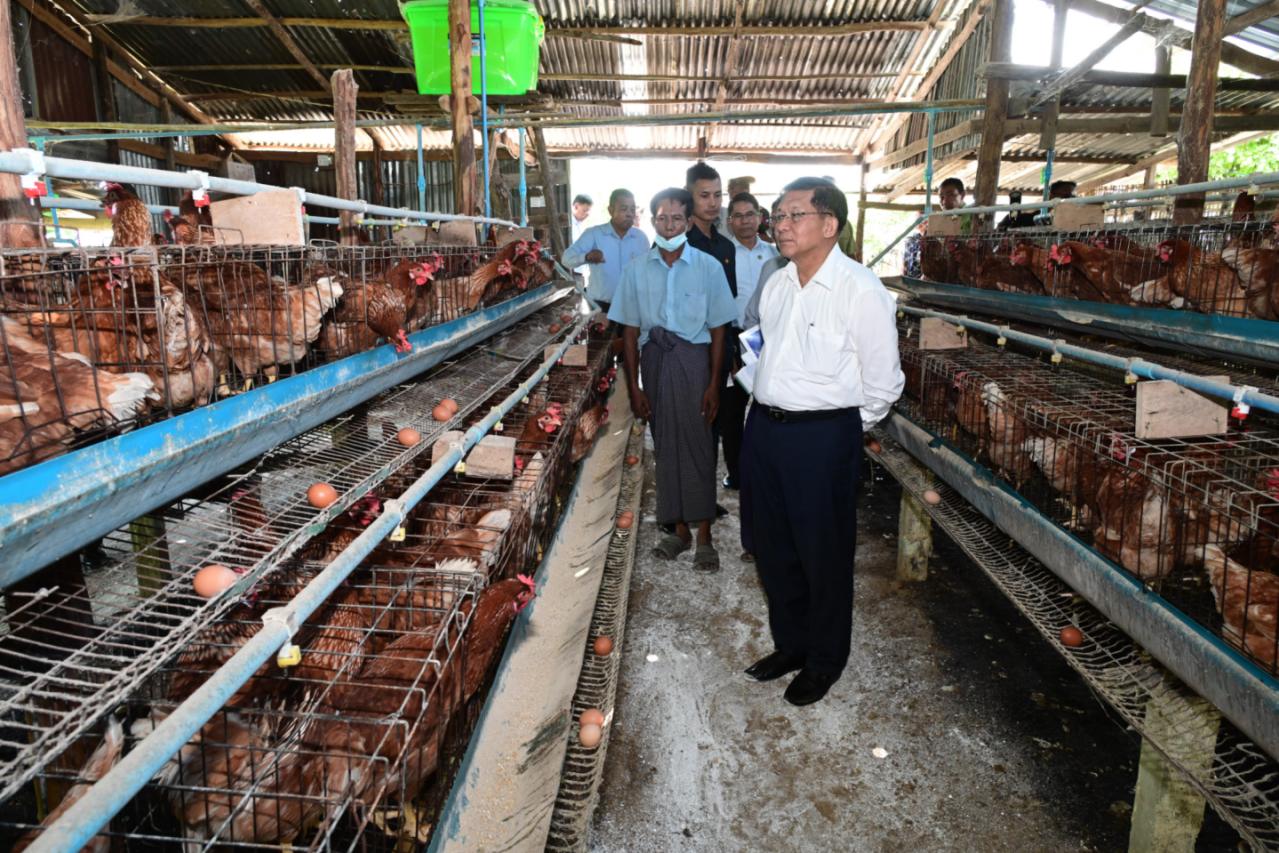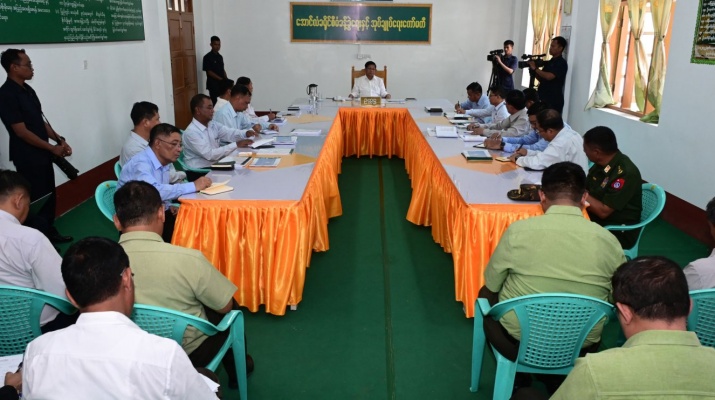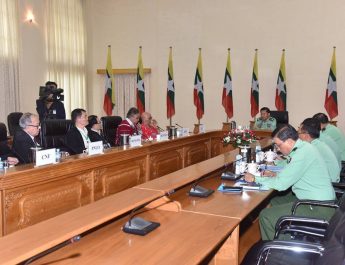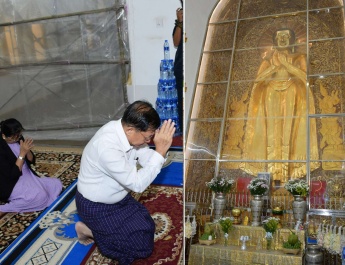Nay Pyi Taw August 20
Chairman of State Security and Peace Commission of the Republic of the Union of Myanmar Senior General Min Aung Hlaing met departmental officials at Aunglan District General Administration Department Office in Aunglan this morning and discussed regional development.
The Senior General was accompanied by SSPC Secretary Joint Executive Chief General Ye Win Oo, union ministers, senior military officers from the Office of the Commander-in-Chief, the Magway Region Chief Minister, the Central Command commander and officials.
At the meeting, the district administrator reported on salient points of the area, local agricultural activities, rice sufficiency, tree-growing ceremonies to green Aunglan District, endeavours for progress of health and education sectors, preparations for the success of the elections, and the need to upgrade the hospital in Aunglan.
Regarding the report, the Senior General pointed out the need to render cooperation for peace, stability and safety of the Aunglan area. He said the hospital in Aunglan will be up-graded in accord with the set standards. The town hall in Aunglang should be properly maintained. He then urged officials to beautify the town through systematic supervision.
Chairman of State Security and Peace Commission of the Republic of the Union of Myanmar Senior General Min Aung Hlaing then delivered an address. He said a plan to turn non-rice fields into rice fields is now underway. Systematic cultivation is the core for increasing crop yield. Magway Region has not realized the crop yield target yet and the failure to hit the target caused nearly Ks-465 billion shortage in annual earnings of Aunglan District. By achieving the desired goal, the production industry will develop and there will be a rise in local supply and demand, which is very supportive of the local economy.
As for further increasing crop yield, the four main requirements of agriculture sufficient land area and water supply and appropriate technology and strains must be in hand. Land preparations and organic fertilizers and soil improvement are essential in agriculture, apart from quality strains that are suitable for the relevant area. As for ensuring sufficient water supply, solar-power pumping stations must be systematically erected along-side the Ayeyawady River, one of the existing water resources. Application of proper agricultural methods is also a requisite in crop cultivation. Significant increase in crop yield will fulfil local rice demand and extended cultivation of traditional crops such as edible oil crops and beans and pulses will be highly beneficial for the region.
Regarding electricity needs, the Senior General stated that solar power generation projects can be carried out. He explained that a region’s development is driven by the improvement of agricultural and farming production businesses. He noted that farming is weak in Aunglan Township and, since animal feed can be produced from local agricultural products, chickens, pigs, goats, and cows can be raised using this feed. He concluded by saying that such farming would greatly support the food needs of the region.
To obtain the necessary human resources for agricultural and farming businesses, industrial, agricultural, and farming high schools are being opened. The Senior General expressed his desire for relevant officials to continuously carry out know-ledge-sharing activities for farmers. He also stated that since cotton is being cultivated in the Aunglan region, it is necessary to develop cotton-related industries from the ground up. He concluded by saying that improving agricultural and farming businesses in the region will greatly contribute to the development of the regional economy.
The Senior General noted that the class transition rate for students in Aunglan District is weak. He stated that only if this rate improves will there be individual progress, which can then contribute to regional development. He added that for the regional economy to improve, it is necessary to work towards having an abundance of educated human resources. In line with the motto “ National discipline begins at school,” he explained that an individual’s morality and discipline differ according to their level of education. He therefore called for cooperation to improve school attendance and class transition rates, stating that a good education will greatly contribute to regional peace, stability, and development.
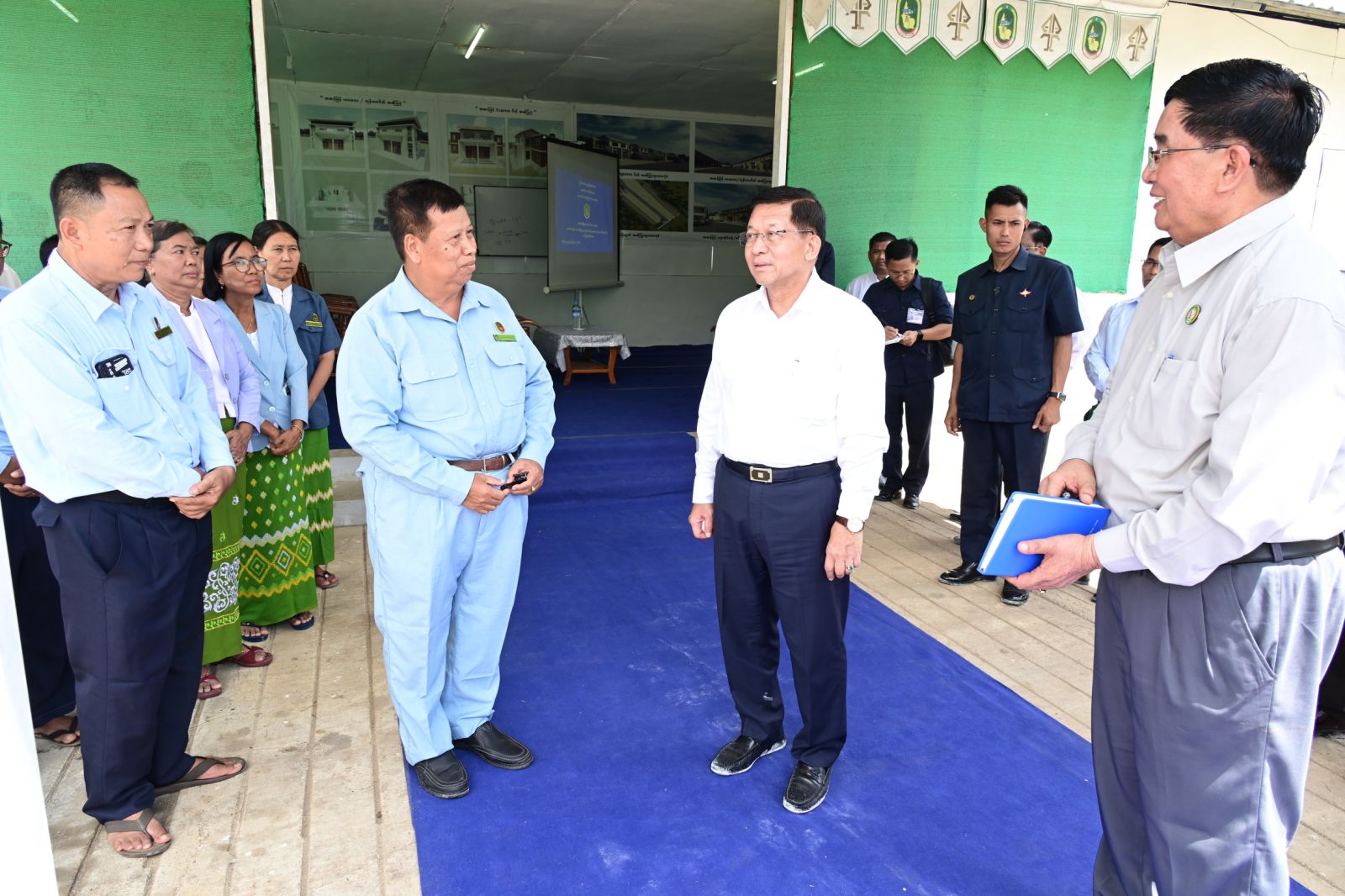
It is necessary to conserve forests and trees in Aunglan and only when there are forests and trees, can disasters be mitigated to some extent. Since assuming State responsibilities, I instructed every village to grow 2-acre of firewood plantation and similarly if each house-hold in wards and townships plants a tree annually, the number of trees will increase. Planting trees in road areas will create a lush and green environment.
Administrative systems have changed in Myanmar in successive eras and during the colonial era, town commissioners, district commissioners and commissioners implemented regional administrations. Under the post-independence parliamentary democracy era, the same administrative system was adopted. In the era of the Burma Socialist Program Party,
chairmen of people’s councils were responsible to manage township affairs above township administrators. During the era of the SLORC, chairmen appointed by the Tatmadaw were responsible for township affairs. Since the era of the SPDC, township and district administrators have been responsible for regional administration.
During the term of the current government, district and township administrators have been tasked with regional development, the rule of law and administration in accordance with the democratic system.
Local residents are responsible for regional development and regional administrators are also responsible for development tasks. Therefore, it is necessary to carry out development tasks of districts and townships as much as possible. Responsible officials in regions are required to implement development tasks in accordance with policies adopted by the State properly. By coordinating among relevant departments, districts and townships will develop.
Then, the Senior General and party arrived at Shwe Tint One Livestock Breeding Zone and inspected layer chicken farms. Responsible officials conducted the Senior General and party around the farm.
After hearing the reports, the Senior General gave instruct-ions on implementing livestock breeding tasks systematically, planting shady and windbreak trees in the livestock breeding zone and cleanliness of the zone.
Then, the Senior General and party inspected the upgrading of the highway bus terminal in Aunglan and gave instructions on systematic operations of the terminal, planting shady and windbreak trees in the terminal, establishing a small forest near the terminal to contribute to the green environment and other needs.
